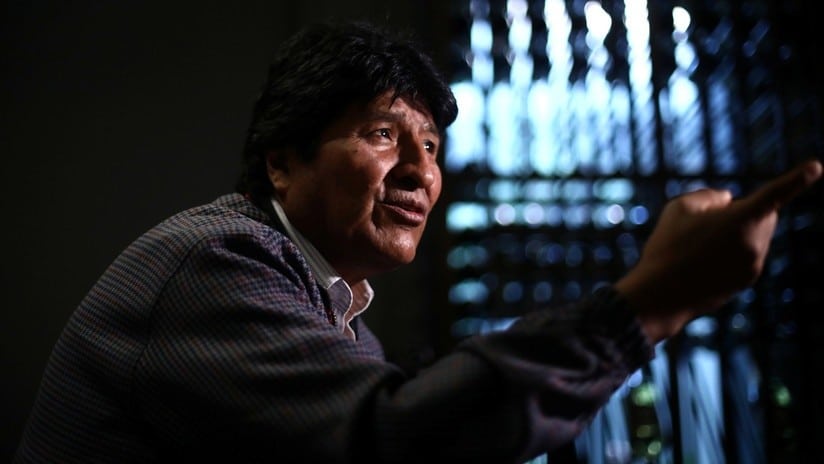Evo Morales: “US Offered me a Plane to Leave Bolivia but I was Sure They Would Take me to Guantanamo”


Orinoco Tribune – News and opinion pieces about Venezuela and beyond
From Venezuela and made by Venezuelan Chavistas

The president said he is willing not to run in the new elections if that helps to pacify the country.
The deposed president of Bolivia, Evo Morales, revealed Friday in an interview with Reuters that the US offered him a plane to take him out of Bolivia, during the escalation of violence unleashed in the streets and the different physical aggressions that have occurred against officials of his party.
“They had called the Minister of Foreign Affairs (of Bolivia) to offer sending a plane for us and to take us wherever we wanted. I was sure it would be to Guantanamo,” said the indigenous leader, referring to the maximum security US prison located in Cuba, a site where Washington usually confines people accused of ‘terrorism’.
The US was one of the nations that did not label as coup d’etat the events in the South American country, and even celebrated the “resignation” of Morales. “It is a significant moment for democracy in the Western Hemisphere,” Trump said on Monday.
RELATED CONTENT: Cartography of a Coup d’état
Two days later, the leader of the MAS (Movement to Socialism), condemned the declarations of the president of the White House and lashed out at his figure: “The coup d’etat is a political and economic conspiracy that comes from the US.”
Participation in the next elections
The Bolivian leader said he would agree not to run for new elections if that helps to pacify the country.
“For democracy, if they don’t want me to participate, I have no problem not participating. I just wonder why they fear Evo so much,” said the ousted president from Mexico City.
Regarding future elections – whose date has not yet been confirmed by the illegal authorities of the de facto government – the former union leader said he does not know who the candidate of the left could be if he does not present himself.
RELATED CONTENT: Massacre in Cochabamba Leaves 7 Coca Syndicalists Dead
How did the coup against Morales happen?
On Sunday, November 10, the armed forces and the police publicly called for the resignation of the president, Evo Morales, who was close to finishing his third term in charge of the Executive and starting a fourth government, after winning the October 20 elections in the first round.
That victory, in October, led to a wave of protests and violence in the South American country.
Given the escalation of the conflicts, driven by opposition groups that did not recognize Morales’s triumph, from his Administration external auditors were called, including the OAS (Organization of American States) and opposition parties, to submit the vote to scrutiny.
When certain irregularities were reported (without real technical support), the president called for new general elections “to seek peace.” However, his proposal was rejected by the opposing party, which demanded his resignation.
In that context, and to avoid intensifying the aggressions against members of his party, the first indigenous president of Bolivia announced his forced resignation and managed to exile himself in Mexico, a country that guaranteed asylum. Recently, the second vice president of the Senate, Jeanine Áñez Chávez, proclaimed herself interim president, stating that the executive’s high command had resigned and considered that she was still in the line of succession.
Featured image: The former president of Bolivia, Evo Morales. Edgard Garrido / Reuters
Translated and edited by JRE/EF